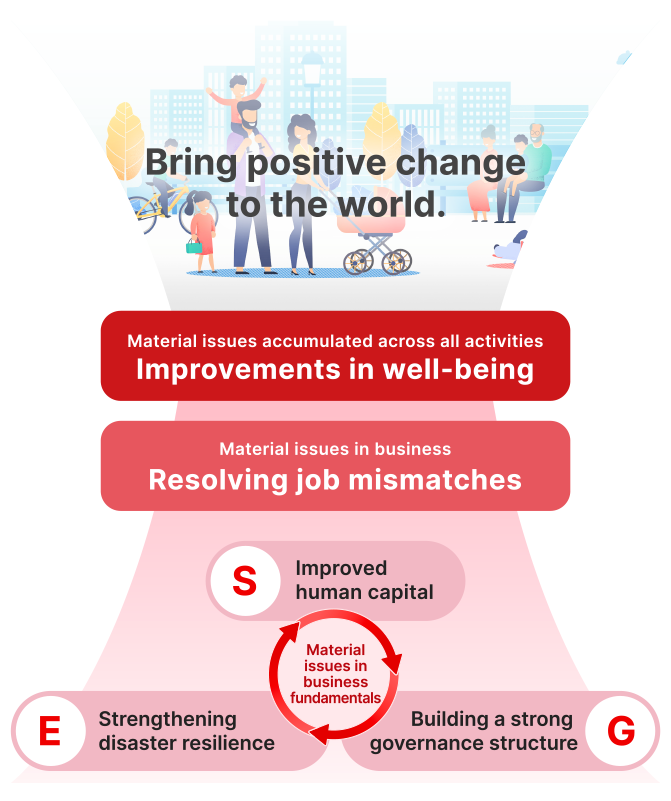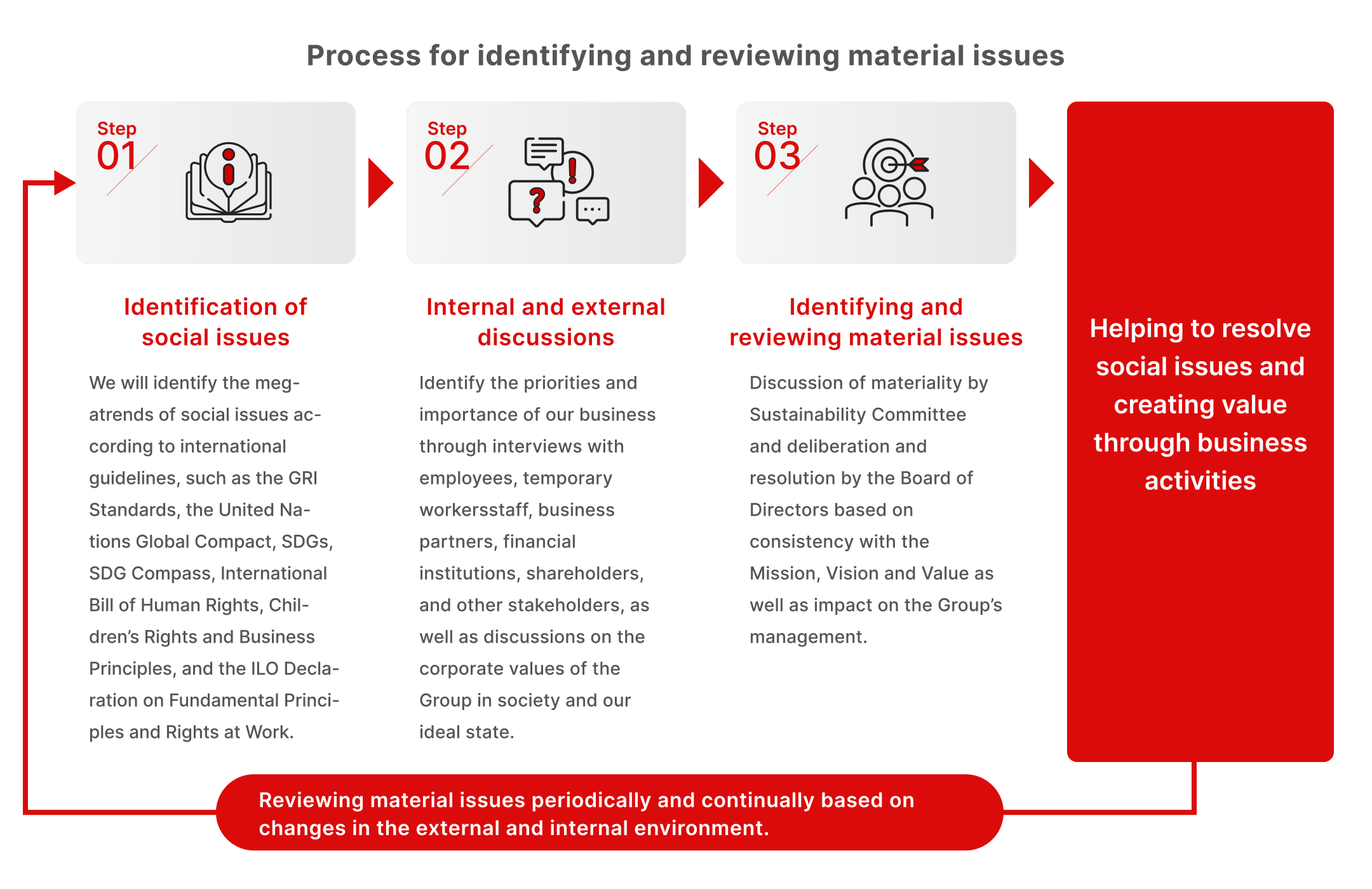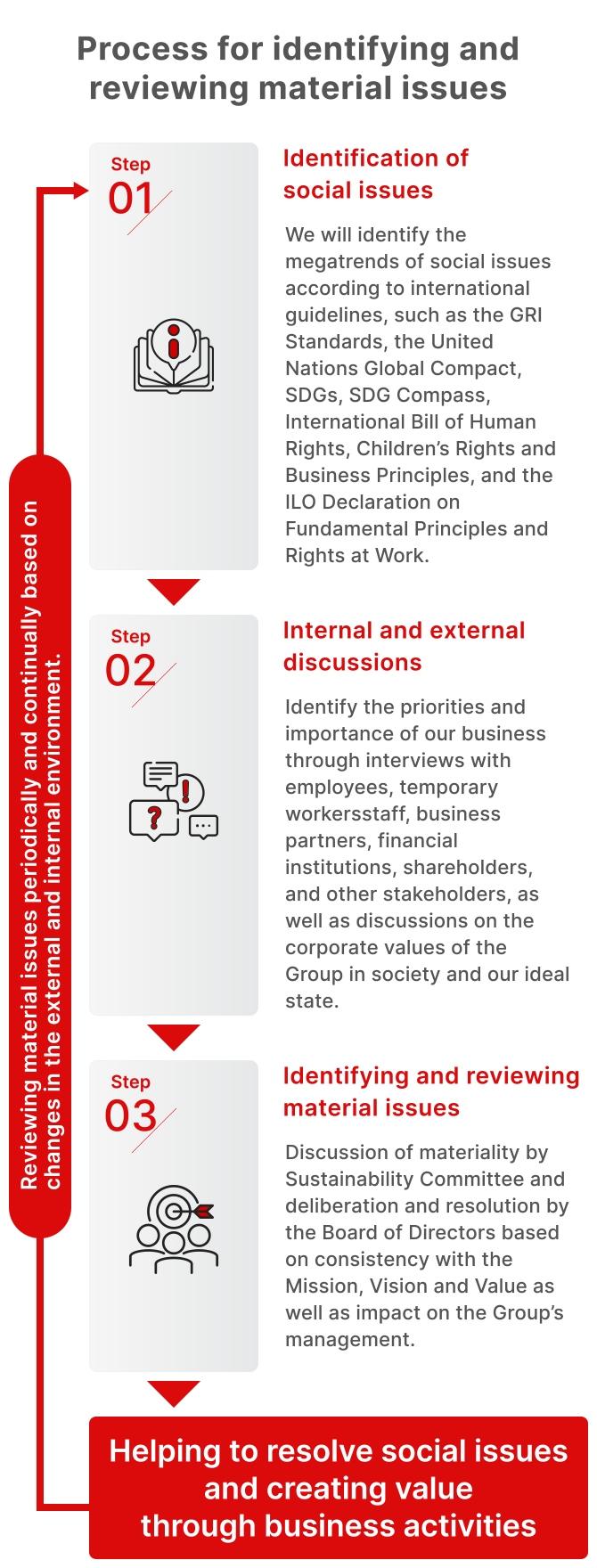Material Issues of the WILL GROUP
- TOP
- Material Issues
- Material Issues of the WILL GROUP
We will address job mismatches, bridging the gap in skills between our customers’ requirements and our staff’s abilities, all aligned with the policy outlined in our Medium-Term Management Plan: Maximizing and Optimizing Career Paths to Transform Workers into Experts. For these reasons, we will prioritize improving human capital, a commitment we have held since our founding. We will also respond to the social demand for combatting climate change as we establish a robust governance system. We anticipate that these initiatives will improve the well-being of our Group’s employees, ultimately contributing to the growth of our corporate value.


| Material Issues | Ideal State | ||
|---|---|---|---|
| Improvements in well-being |
|
||
| Indicators | Results FY2023 | Target | |
| Well-being score | 66.5pt | No specific targets are set, as well-being is seen as the cumulative outcome of all activities and is expected to increase as a result of various means. | |
| Workplace well-being score | |||
| Work experience | 50.9% | ||
| Work evaluation | 61.1% | ||
| Self-determination at work | 57.6% | ||
| Material Issues | Ideal State | ||
|---|---|---|---|
| Resolving job mismatches (Related SDGs) |
|
||
| Indicators | Results FY2023 | Target | |
| Number of permanent employees on assignment for non-fixed term staffing service | 3,866 | More than double in FY2023 | |
| Number of career advancements from fixed-term to permanent positions | 98 | 500 per year | |
| Growth support score | |||
| Assignment for permanent employees on assignment for non-fixed term staffing service | 45.9% | Increase every year | |
| Temporary workers | 34.9% | ||
| Number of people providing support for acquiring qualifications | 1,374 | To be determined | |
| Average duration of employment | 739.8 days | Increase every year | |
| Material Issues | Ideal State | ||
|---|---|---|---|
| Strengthening disaster resilience (Related SDGs) |
|
||
| Indicators | Results FY2023 | Target | |
| Formulation of BCP | - | Formulation of BCP | |
| GHG emissions | 1,565.2t-CO2 | Reduce by 20% compared to FY2020 | |
| Workplace safety preparedness score | 61.3% | To be determined | |
| Material Issues | Ideal State | ||
|---|---|---|---|
| Improved human capital (Related SDGs) |
|
||
| Indicators | Results FY2023 | Target | |
| Job satisfaction score | 52.9% | 60% or more | |
| Growth satisfaction score | 57.8% | 60% or more | |
| Percentage of female managers | 30.4% | Have as approximately equal to the percentage of permanent female employees (42.1% in FY2023) | |
| Percentage of mid-career managers | 77.1% | Have as approximately equal to the percentage of permanent mid-career employees (73.3% in FY2023) | |
| Percentage of non-Japanese managers | 40.0% | Have as approximately equal to the percentage of permanent non-Japanese employees (24.2% in FY2023) | |
| Employment rate of people with disabilities | 2.3% | Equal to or above the statutory employment rate | |
| Percentage of applicants for promotion | 42.5% | 60.0% | |
| Wage gap between male and female employees | 73.5% | To be determined | |
| Happiness in the workplace | |||
| A culture of safety and peace of mind | 71.7% | More than the same month last year | |
| A workplace atmosphere built on mutual trust | 72.3% | ||
| An atmosphere that encourages challenges | 72.1% | ||
| Workplace recommendation rate | 60.6% | ||
| Material Issues | Ideal State | ||
|---|---|---|---|
| Building a strong governance structure (Related SDGs) |
|
||
| Indicators | Results FY2023 | Target | |
| Enhancing the effectiveness of the Board of Directors | - | Regularly implement effective evaluations | |
| Percentage of outside directors | 60.0% | 30% or more | |
| Percentage of female directors | 20.0% | 30% or more | |
| Separation of management and oversight | - | Strengthen the supervisory capabilities of the Board of Directors | |
| Number of serious information leaks | 0 | 0 | |
| Number of harassment cases leading to disciplinary dismissal | 0 | 0 | |
| Number of cases of misconduct (bribery, corruption, fraud, accounting fraud) | 0 | 0 | |
| Compliance training attendance rate | 72.5% | 100% | |
| Number of serious workplace accidents | 0 | 0 | |
Process for identifying and reviewing material issues
The Group identified material issues by interviewing stakeholders, mapping the value chain, and examining social values and the ideal state of the Company, according to international guidelines such as the Global Reporting Initiative (GRI) Standards, the United Nations Global Compact and SDGs. Then, we reviewed the material issues based on deliberations at the Sustainability Committee and advice from external experts.
We will continue our discussions to meet the challenges and expectations of society as the external environment changes.



